In an increasingly cashless society, making payments often means choosing between a debit or credit card. This choice isn’t merely about convenience; it speaks volumes about financial management and goals. Delving into the pros and cons of debit cards vs. credit cards provides valuable insights for those hindered by this decision. Here, we compare and contrast these payment methods. We’ll explore various factors such as interest rates, fees, rewards, security, and budgeting.
Debit Cards: Spend What You Have
The primary allure of debit cards lies in their simplicity and direct connection to your bank account. This allows you to spend only within your means and reduces the risk of accruing debt. This direct expenditure from your account facilitates real-time budget tracking. This makes it easier to manage finances without worrying about interest rates or annual fees that credit cards might impose.
However, the downside is that debit cards offer minimal protection against fraud compared to credit cards. They do not aid in building your credit history, a crucial element for securing loans or mortgages. Furthermore, the potential for overdraft fees exists if you spend more than your account balance unless you’ve opted out of overdraft coverage, which can be a financial pitfall.
Credit Cards: Borrow Now, Pay Later
Contrary to debit cards, credit cards allow you to borrow money up to a certain limit to pay for purchases, with the expectation of paying back the borrowed amount. One of the notable advantages is their contribution to building and enhancing your credit score—an invaluable asset for future financial endeavors. Credit cards often come packed with rewards programs and consumer protections, including fraud liability and purchase warranties, which are seldom found with debit cards. However, they are not without pitfalls.
The temptation to spend beyond one’s means is higher with credit cards, given the disconnect between spending and the immediate reduction in bank balance. Interest and fees can accumulate if balances are not paid in full, leading to a cycle of debt. Additionally, missed payments and high utilization can negatively impact your credit score.
Pros and Cons of Debit Cards vs. Credit Cards
Fees and Interest Rates
The convenience of plastic money comes at a cost. While debit cards usually boast fewer fees, falling into an overdraft can be an expensive mistake. On the flip side, credit cards come with various fees: annual charges, late payment fees, and more. Understanding the pros and cons of debit cards vs. credit cards necessitates a careful look at these potential costs, urging consumers to consider how these fees align with their financial habits and goals.
Rewards: Earning as You Spend
The opportunity to earn rewards, whether in the form of points, miles, or cashback, is a significant advantage of credit cards over debit cards. It’s crucial to discover whether the benefits of these rewards outweigh the risks and costs associated with credit card usage, ensuring that the pursuit of rewards doesn’t compromise financial health.
Security: Safeguarding Your Finances
Credit cards generally offer superior consumer protections, significantly mitigating the financial impact of unauthorized transactions. Debit cards, while convenient, pose a risk in this area; unauthorized use can directly affect your bank account, potentially straining your finances until the issue is resolved.
Making the Right Choice With DEXSTA
The option of using a debit card, credit card, or both presents its own set of advantages and potential drawbacks. Whether you prioritize direct budget control with a debit card or value the credit-building and rewards programs that come with a credit card, understanding your financial habits and needs is key.
DEXSTA understands the importance of making the right financial choices. We are committed to helping our members navigate the pros and cons of debit cards vs. credit cards with our range of financial resources services tailored to meet your unique needs. If you’re still unsure about which option is best for you, or if you’d like to learn more about the benefits and features of each card we offer, we invite you to reach out. Our team is here to provide the assistance and information you need to make the most informed decision.
